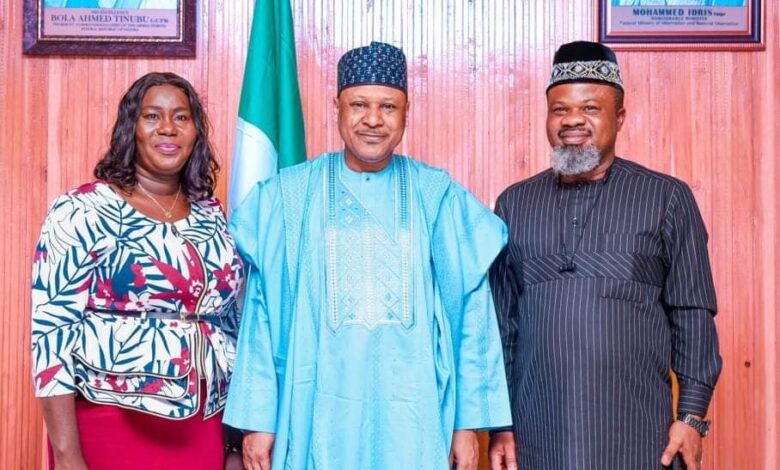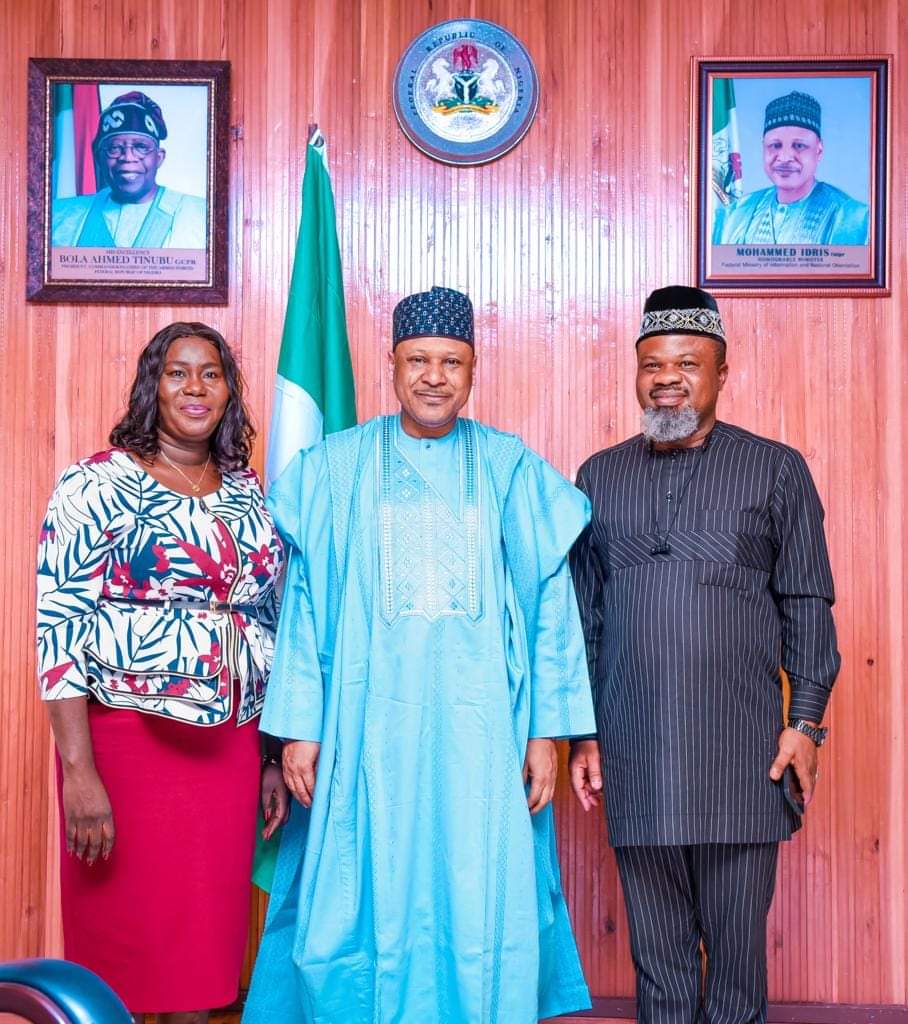Prioritizing Media Support: Minister Idris’ Pledge to Strengthen Democracy
Government to Prioritize Media Support, Says Idris

Government to Prioritize Media Support, Says Idris
The Minister of Information and Culture, Alhaji Mohammed Idris, has announced that the government is now committed to significantly improving support for media professionals.
Addressing the National Union of Journalists (NUJ), Idris stressed that media professionals and news reporters play a crucial role in advancing democracy, and the government is dedicated to ensuring their well-being.
The visit took place on Tuesday, October 10, 2023, where the Minister highlighted the challenges that media professionals and news reporters face, including the need for accurate information and their overall health and safety.
He emphasized the importance of the NUJ in preserving democracy and the vital role it plays in ensuring a free and open society.
He urged them to work hand in hand to achieve their goals and get the necessary support. He said, “Our common goal is to ensure that journalists can do their work without any fear for their lives or well-being.”
Moreover, he acknowledged that media professionals are critical in delivering news and information to the Nigerian people and should be protected and respected for their role in society.
Idris also commended the efforts of Bola Ahmed Tinubu’s government in supporting media professionals and ensuring they can perform their roles without intimidation or hindrance.
In response, the President of the NUJ, Mr. Chris Isiguzo, stressed the importance of addressing the challenges faced by media professionals, including the protection of journalists, freedom of the press, government regulations, health, and safety issues, as well as the daily challenges of life.
He also pledged to provide the Minister with comprehensive insights into how to tackle these issues effectively.
Prioritizing Media Support: Minister Idris’ Pledge to Strengthen Democracy
In a recent address to the National Union of Journalists (NUJ), Minister of Information and Culture, Alhaji Mohammed Idris, highlighted the government’s commitment to bolster support for media professionals. He emphasized the crucial role media plays in a thriving democracy and pledged to ensure the well-being and safety of journalists and news reporters. This blog post explores Minister Idris’ message and the significance of the government’s commitment to supporting the media.
The Role of Media in Democracy
Media professionals and news reporters are the linchpins of any democracy, ensuring the free flow of information and holding those in power accountable. Their role in shaping public opinion and providing accurate and timely information is essential for a well-functioning society. Minister Idris acknowledged this role, emphasizing the government’s commitment to strengthening this vital pillar of democracy.
Acknowledging the Challenges
In his address, Minister Idris acknowledged the challenges faced by media professionals. These challenges include the need for accurate information, concerns about safety, and the overall well-being of journalists. He recognized that media professionals often work under difficult conditions, from reporting in conflict zones to exposing corruption and other critical issues. Their work can sometimes put them at risk, making their safety and protection a priority.
Government Commitment to Support
Minister Idris made it clear that the government is fully dedicated to supporting media professionals and ensuring they can perform their roles without intimidation or hindrance. He pledged that the government would work closely with the NUJ to address these challenges effectively.
The Importance of a Free and Open Society
A free and open society is a cornerstone of a healthy democracy. Protecting the freedom of the press and the safety of media professionals is vital in maintaining this ideal. Minister Idris commended the government of Bola Ahmed Tinubu for its efforts to support media professionals and its commitment to upholding democratic principles.
Collaborative Efforts
Minister Idris encouraged media professionals and the NUJ to work collaboratively to achieve their common goals. He recognized the shared objective of ensuring that journalists can perform their work without fear for their lives or well-being. In unity, they can tackle the challenges facing the media industry more effectively.

The Vital Role of Media in a Thriving Democracy
Media, often referred to as the “Fourth Estate,” plays a pivotal role in shaping and sustaining a thriving democracy. It serves as the watchdog, the informer, and the conduit for public discourse. In this blog post, we will explore the indispensable role of media in a democratic society, examining how it upholds accountability, provides information, and fosters a well-informed citizenry.
The Guardian of Democracy
- Accountability and Oversight: One of the primary roles of media in a democracy is to act as a check on the government’s power. Journalists investigate and expose corruption, misconduct, and abuses of authority. They hold public officials accountable for their actions, ensuring that the government remains transparent and responsive to the needs of the people.
- Transparency and Openness: Media outlets provide a window into the workings of the government, offering insights into policy decisions, debates, and the legislative process. This transparency helps citizens make informed choices about their leaders and policies.
The Informer and Educator
- Dissemination of Information: Media is the principal source of information in society. It delivers news, updates, and analysis on a wide range of topics, from politics and economics to health and culture. This information equips citizens with the knowledge they need to participate in the democratic process.
- Diverse Perspectives: Media outlets serve as platforms for diverse perspectives and opinions. They offer a range of viewpoints on various issues, encouraging critical thinking and promoting a more comprehensive understanding of complex topics.
Fostering a Well-Informed Citizenry
- Civic Engagement: Informed citizens are more likely to engage in civic activities such as voting, community involvement, and activism. Media’s role in providing accurate and unbiased information empowers people to actively participate in the democratic process.
- Public Discourse: Media encourages public discourse and debate. It serves as a forum for discussing important issues, allowing citizens to voice their concerns, express their views, and influence public opinion.
- Holding Power to Account: In a democracy, power rests with the people. Media helps ensure that those in positions of authority remain accountable to the public. It exposes wrongdoing, uncovers injustice, and champions the rights and interests of the people.
Challenges Faced by Media in Democracy
While the role of media in a democracy is essential, it faces several challenges, including:
- Fake News and Misinformation: The spread of false or misleading information can erode public trust in media. It is imperative to combat misinformation and promote fact-checking and responsible journalism.
- Press Freedom: In some regions, media outlets face censorship, threats, or restrictions on their ability to report freely. Upholding press freedom is crucial for media to fulfill its democratic role.
- Economic Pressures: The digital age has disrupted traditional business models for media organizations, leading to financial pressures and job cuts. Sustaining quality journalism in this landscape is a challenge.

Acknowledging Challenges: A Step Towards Positive Change
Acknowledging challenges is the first step towards addressing them effectively. Whether in our personal lives, our workplaces, or in broader societal contexts, recognizing and confronting challenges is essential for growth, improvement, and positive change. In this blog post, we will explore the significance of acknowledging challenges and how it can lead to meaningful progress.
The Power of Acknowledgment
- Awareness: Acknowledging challenges brings them into our awareness. It is the recognition that a problem or obstacle exists, and this awareness is the starting point for finding solutions.
- Validation: Acknowledgment validates the experiences and feelings of those affected by challenges. It shows that their concerns are real and deserving of attention and resolution.
- Motivation: Acknowledging challenges can serve as a powerful motivator. It prompts individuals and organizations to take action and make the necessary changes to overcome obstacles.
- Learning Opportunity: Challenges offer valuable lessons. Acknowledging them provides an opportunity for reflection and growth, both personally and professionally.
Personal Growth
- Overcoming Adversity: In our personal lives, acknowledging challenges is the first step towards overcoming adversity. Whether it’s a health issue, a difficult relationship, or a financial setback, accepting the reality of the situation allows us to work towards solutions.
- Self-Improvement: Acknowledging personal challenges, such as bad habits or areas of weakness, is the initial phase of self-improvement. It enables us to set goals for change and growth.
Workplace and Organizational Improvement
- Productivity and Innovation: In the workplace, recognizing challenges can lead to increased productivity and innovation. Identifying inefficiencies or obstacles in processes allows for improvements and increased effectiveness.
- Team Collaboration: Acknowledgment fosters an environment of open communication within teams. It encourages team members to share their concerns and ideas for improvement, leading to better collaboration.
- Customer Satisfaction: Acknowledging challenges in customer feedback or service-related issues is crucial for maintaining customer satisfaction. Addressing concerns promptly shows a commitment to quality service.
Societal Progress
- Social Issues: Acknowledging societal challenges, such as inequality, discrimination, or environmental concerns, is the first step towards positive change. Recognizing these issues brings them to the forefront of public discourse and paves the way for collective action.
- Political Change: Acknowledging political challenges, including corruption or governance issues, can lead to political reform and a more accountable government. Public acknowledgment of these challenges can spark movements for change.
Government’s Pledge to Strengthen Support: A Path to Progress
A government’s commitment to providing support and assistance to its citizens is a fundamental aspect of responsible governance. The provision of support extends to various sectors, including healthcare, education, social services, and economic development. In this blog post, we will explore the significance of government commitment to support and how it fosters progress and well-being within a nation.
Government Support as a Pillar of Governance
- Ensuring Equal Opportunities: Government support programs aim to ensure that all citizens, regardless of their socio-economic background, have equal access to essential services and opportunities. This commitment promotes social equity and reduces disparities.
- Safeguarding Vulnerable Populations: Governments are responsible for safeguarding the welfare of vulnerable populations, including children, the elderly, and individuals with disabilities. Support programs and services are designed to protect these groups and provide them with necessary assistance.
Key Areas of Government Support
- Healthcare: Access to quality healthcare is a fundamental human right. Government commitment to healthcare support includes programs for affordable healthcare, vaccination campaigns, and initiatives to combat diseases and epidemics.
- Education: Investment in education is an investment in the future. Governments commit to supporting education by providing free or affordable schooling, scholarships, and initiatives to improve educational infrastructure and access.
- Economic Development: Governments foster economic growth through support for businesses, entrepreneurship, and job creation. Economic support programs help stimulate the economy, reduce poverty, and enhance the overall quality of life.
- Social Services: Social services encompass various forms of support, including housing, food assistance, and programs for at-risk populations. These services aim to address social challenges and provide safety nets for those in need.
Fostering a Strong Society
- Social Cohesion: Government commitment to support strengthens social cohesion by addressing the needs of diverse communities. It promotes unity and solidarity, fostering a sense of belonging and shared purpose among citizens.
- Empowerment: Government support empowers individuals and communities by providing them with the tools and opportunities they need to thrive. This empowerment results in more engaged, self-reliant citizens.
Demonstrating Responsibility
- Accountability: Governments that fulfill their commitment to support demonstrate accountability to their citizens. Transparent and responsible governance includes allocating resources efficiently and ensuring that support reaches those who need it most.
- Public Trust: A government that keeps its promises to support its citizens garners trust from the public. Trust in government is a cornerstone of a stable and prosperous society.







